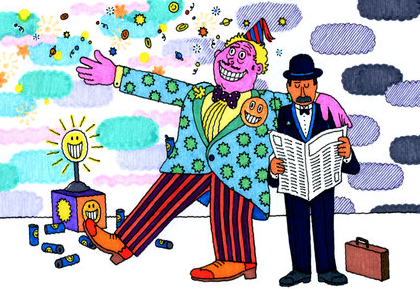 I'm finding the "Anxiety" topic in the Opinionator series at the NYTimes to be a real treat. This entry by British expatriate Ruth Whippman brings back memories of a my signing on several years ago to be a talking head neuroscience expert on the California "Make Me Happy!" Radio Show (I don't think they were all that pleased with their dyspeptic guest!). Whippman notes the American obsession with, and anxiety over, being "happy", and contrasts this with the attitudes of more stoic Britishers:
I'm finding the "Anxiety" topic in the Opinionator series at the NYTimes to be a real treat. This entry by British expatriate Ruth Whippman brings back memories of a my signing on several years ago to be a talking head neuroscience expert on the California "Make Me Happy!" Radio Show (I don't think they were all that pleased with their dyspeptic guest!). Whippman notes the American obsession with, and anxiety over, being "happy", and contrasts this with the attitudes of more stoic Britishers:
Happiness in America has become the overachiever's ultimate trophy. A vicious trump card, it outranks professional achievement and social success, family, friendship and even love…this elusive MacGuffin is creating a nation of nervous wrecks. Despite being the richest nation on earth, the United States is, according to the World Health Organization, by a wide margin, also the most anxious, with nearly a third of Americans likely to suffer from an anxiety problem in their lifetime. America's precocious levels of anxiety are not just happening in spite of the great national happiness rat race, but also perhaps, because of it.
The British are generally uncomfortable around the subject, and as a rule, don't subscribe to the happy-ever-after. It's not that we don't want to be happy, it just seems somehow embarrassing to discuss it, and demeaning to chase it, like calling someone moments after a first date to ask them if they like you….Even the recent grand spectacle of the London 2012 Olympic Games told this tale. The opening ceremony, traditionally a sparklefest of perkiness, was, with its suffragist and trade unionists, mainly a celebration of dissent, or put less grandly, complaint…Our queen, despite the repeated presence of a stadium full of her subjects urging in song that she be both happy and glorious, could barely muster a smile, staring grimly through her eyeglasses and clutching her purse on her lap as if she might be mugged.
Cynicism is the British shtick. When happiness does come our way, it is entirely without effort, as unmeritocratic as a hereditary peerage. By contrast, in America, happiness is work. Intense, nail-biting work, slogged out in motivational seminars and therapy sessions, meditation retreats and airport bookstores. For the left there's yoga, for the right, there's Jesus. For no one is there respite…The people taking part in "happiness pursuits," as a rule, don't seem very happy…The happy person would be more likely to be off doing something fun, like sitting in the park drinking.
Happiness should be serendipitous, a by-product of a life well lived, and pursuing it in a vacuum doesn't really work. This is borne out by a series of slightly depressing statistics. The most likely customer of a self-help book is a person who has bought another self-help book in the last 18 months. The General Social Survey, a prominent data-based barometer of American society, shows little change in happiness levels since 1972, when such records began. Every year, with remarkable consistency, around 33 percent of Americans report that they are "very happy." It's a fair chunk, but a figure that remains surprisingly constant, untouched by the uptick in Eastern meditation or evangelical Christianity, by Tony Robbins or Gretchen Rubin or attachment parenting. For all the effort Americans are putting into happiness, they are not getting any happier. It is not surprising, then, that the search itself has become a source of anxiety.
So here's a bumper sticker: despite the glorious weather and spectacular landscape, the people of California are probably less happy and more anxious than the people of Grimsby. So they may as well stop trying so hard.

